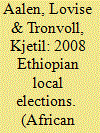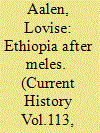| Srl | Item |
| 1 |
ID:
085978


|
|
|
|
|
| Publication |
2009.
|
| Summary/Abstract |
ETHIOPIA CARRIED OUT LOCAL ELECTIONS FOR NEIGHBOURHOOD (kebele) and county (woreda) assemblies on 13 and 20 April 2008, respectively.1 By law, these elections were supposed to be conducted in 2005, but the chaotic period after the general elections that year made it impossible to carry out the local polls. Considering the formative character of the 2005 general elections, where the opposition for the first time challenged the ruling Ethiopian People's Revolutionary Democratic Front (EPRDF), and the dramatic political crackdown in the post-election period, the conduct of the 2008 local elections is important in understanding the status and direction of Ethiopia's overall process of democratization. The constrained political context and government strategies of intimidation and harassment - leading the main opposition parties to withdraw from the local elections - signal the return of electoral authoritarianism in Ethiopia.
|
|
|
|
|
|
|
|
|
|
|
|
|
|
|
|
| 2 |
ID:
130219


|
|
|
|
|
| Publication |
2014.
|
| Summary/Abstract |
When Meles Zenawi, the national and ruling party leader for 21 years, died in August 2012, most observers predicted that Ethiopia would be thrown into an uncertain transition and put in great danger by
destructive internal power struggles and external pressure. As the months went by, none of these things happened. Instead, the world witnessed a peaceful succession, and a calm status quo has been maintained under the new prime minister, Hailemariam Desalegn.
|
|
|
|
|
|
|
|
|
|
|
|
|
|
|
|
| 3 |
ID:
122765


|
|
|
|
|
| Publication |
2013.
|
| Summary/Abstract |
As pointed out by Roeder and Rothchild (P. G. Roeder and D. Rothchild (eds), Sustainable Peace: Power and Democracy after Civil Wars (New York: Cornell University Press 2005)), a crucial dilemma in post-war power-sharing arrangements is that the very same institutions that provide an attractive basis for ending a conflict are likely to hinder the consolidation of peace and democracy in the long term. The 2005 Comprehensive Peace Agreement (CPA) was the major reason for ending Sudan's North-South civil war - for 'winning the war' - but did also create the conditions for 'losing the peace'? This article looks at the power-sharing arrangements of the CPA and its impact on the conditions from peace and democracy in Sudan in the interim period prior to the referendum on southern independence. Through analyses of its formal institutional frames, its implementation, and the major stakeholders' perceptions, it becomes clear that the power sharing did not 'make unity attractive', as initially anticipated, but was in fact one of the factors contributing to the separation of Sudan in 2011.
|
|
|
|
|
|
|
|
|
|
|
|
|
|
|
|